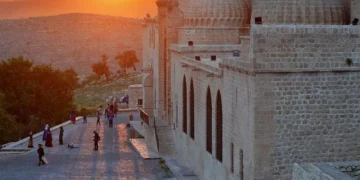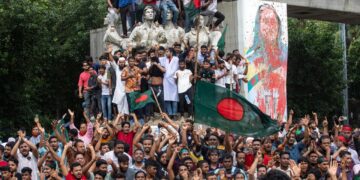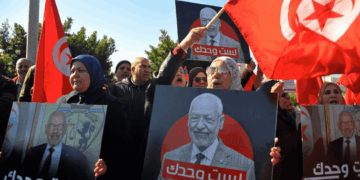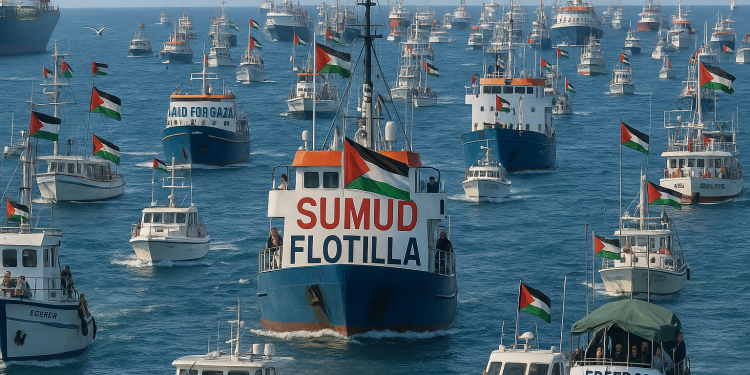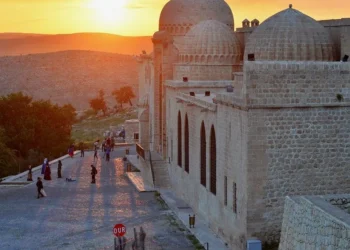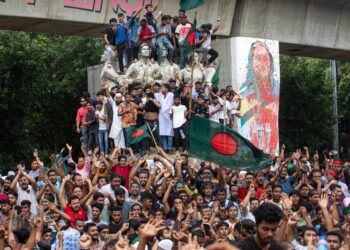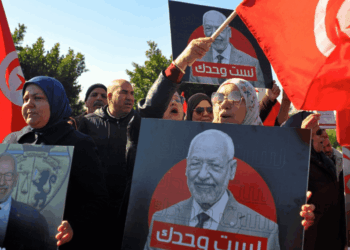The Global Sumud Flotilla, which seeks to overcome Israel’s blockade of Palestine, aims to establish a secure and sustainable maritime corridor to facilitate the delivery of humanitarian aid to Gaza. As the ILKE Foundation’s “Platform Project: The Agenda of the Muslim World” team, we present excerpts from interviews conducted with activists participating in this initiative to understand its on-the-ground dynamics, sources of motivation, and position within the framework of international law.
Activist Dilek Tekocak shared her insights with Platform:
1. What is the primary objective of the Global Sumud Flotilla?
The Global Sumud Flotilla fundamentally underscores that, under international law, the imposition of a food embargo is impermissible even in times of war. Setting out to draw attention to Israel’s unlawful practices in Gaza, mobilize the global conscience, and foster international awareness, the flotilla constitutes the largest civilian initiative ever undertaken at sea to date.
In addition to aiming to establish a maritime humanitarian corridor to overcome Israel’s blockade of Gaza, create a lever of pressure against Israel in the court of global public opinion, deliver humanitarian aid to the Palestinian population residing in Gaza, and pave the way for sustained assistance, it aspires to take the most significant step toward ending the genocide.
2. What are your observations from the field?
A vast organizational effort is underway for what may be the largest civilian maritime mobilization in human history. Hundreds of individuals are doing everything in their power to participate in this initiative. In parallel, thousands more are lending support from the shore to raise their voices against Israel’s genocide against the Palestinian people. Delegations and team members are working diligently to meticulously plan every detail, ensuring the Sumud Flotilla achieves its objectives. During our training period in Tunisia, we were warmly welcomed by the public and sent off with great enthusiasm. From all around the world—and irrespective of religion, language, race, or ideological differences—we are building a strong, collective voice based on mutual respect, collaborating to end the blockade of Gaza and bring the genocide to an end.
This journey has afforded us a uniquely valuable experience. When it comes to our values, it has served as a formative school aboard ship, teaching us to set aside divisions.
3. What is the flotilla’s progress in terms of route and prevailing weather/sea conditions?
Today is Sunday, 21 September. We set sail on the evening of Sunday, 16 September, and we are now on the seventh day of our journey. The flotilla is proceeding with considerable caution; due to adverse weather conditions, we were compelled to wait for a day and a half off the coast of Sicily. Such delays, inevitably, dampen the team’s morale. We are eager to reach Gaza as soon as possible; however, these setbacks are sometimes unavoidable. From this point forward, we aim to proceed toward Gaza without interruption. We pray for our path to be eased—for calming winds and tranquil seas.
4. Approximately how long do you expect it will take to reach Gaza?
We convened in international waters with vessels that set sail from ports in Spain, Tunisia, and Italy, and additional boats will join the flotilla from Greece. As we are now in mid-September, adverse weather conditions have become more pronounced. Consequently, our journey is taking longer than initially planned. For this reason, we cannot provide an exact day or date. However, if all proceeds smoothly, we expect to arrive in Gaza on 29 September. We aim to reach Gaza in the shortest feasible time without putting the flotilla at risk.
5. How is coordination with local and international authorities maintained?
The Global Sumud Flotilla is a large-scale organization composed of participants from dozens of countries. Beginning in Türkiye, continuing through the Tunisia phase, and from the moment our voyage commenced on board, we have utilized communication channels that enable us to stay in contact with both local and international authorities. Updates regarding the flotilla’s status, news from Gaza, developments in our respective countries, and onboard announcements have proceeded smoothly through these communication tools.
6. What is the most important message you wish to convey to the public?
Public support for the Global Sumud Flotilla from the shore will strengthen the initiative’s public legitimacy and moral foundation. Within the Sumud Flotilla, we also represent millions of conscientious individuals. Demonstrating to Israel that we are far more numerous than the roughly one thousand Sumud activists is the most effective way to ensure the flotilla fulfills its mission. Everyone who supports these millions is, in effect, a Sumud activist, someone striving to break the blockade and crying out for an end to the genocide. The ultimate aim of this path is to initiate the most consequential step toward ending the genocide.
Activist Halil Rıfat Çanakçı shared his insights with Platform:
1. What is the primary objective of the Global Sumud Flotilla?
The primary objective of the Global Sumud Flotilla is to break the comprehensive blockade imposed on Gaza by Israel and, through this, to establish a sustainable maritime humanitarian corridor. A secondary aim of the initiative is to keep a forceful call for an end to the oppression in Gaza on the international agenda, while ensuring that humanitarian assistance is delivered to the people of Gaza effectively, safely, and in line with prioritized needs. Nevertheless, the foremost objective remains the dismantling of the total blockade imposed on Gaza.
2. What are your observations from the field?
Approximately twenty percent of the participants are Muslims, while the remainder consists of activists from the West and various other regions of the world. In the field, we observe that activists coming particularly from Western countries display an exceptionally high sensitivity toward Gaza. Western activists articulate their motivation by stating, ‘Just as you have Islamic sensibilities, we possess anti-imperialist sensibilities,’ indicating that they are taking part in the process on this basis. These groups, mainly originating from leftist movements, engage in action driven by humanitarian and humanist motivations.
Indeed, an activist I spoke with in Tunisia laid bare this sensitivity by stating, ‘Every morning I wake up feeling unsettled because of the ongoing oppression in Gaza.’ This also renders visible, from the standpoint of Muslim communities, a shortfall in mobilization. Participants are demonstrating a high degree of resolve toward the objective of breaking the siege. By way of example, despite calls following the drone attacks that ‘those who wish to leave the flotilla may do so,’ we observed very few departures. The vast majority, cognizant of the gravity of the process, have expressed a determination to continue by sea and to pursue the goal of reaching Gaza.
The ultimate aim of the Sumud Flotilla is to break the blockade and to ensure that a forceful call for ending the oppression in Gaza remains sustainably on the international agenda. In this context, activists are demonstrably more successful than Muslim communities in mobilizing significantly broader audiences and generating visible public attention. When they gather, their numbers reach into the hundreds of thousands. Regrettably, I must note that we, as Muslims, have been comparatively weak in this regard.
3. What is the flotilla’s progress in terms of route and prevailing weather/sea conditions?
Initially, departures were made from the ports of Barcelona. These flotillas converged in Tunisia and proceeded to Sicily. From Sicily, we will set course toward our primary destination, Gaza. The initial launch thus took place from Barcelona. During the Tunisia phase, various administrative and security-related challenges were encountered, resulting in deviations from the schedule. We joined the process from the ports in Sicily. Due to specific operational and security-based disruptions, we were compelled to depart later than planned. We are currently sailing south of Crete.
4. Approximately how long do you expect it will take to reach Gaza?
Under normal circumstances, our route was planned to proceed directly from Sicily toward Gaza. However, as is known, following Israel’s unmanned aerial attacks, our departure was postponed within the framework of security assessments and risk mitigation measures. As of 26 September 2025, we will set out in the afternoon toward our target, Gaza. Naturally, we may be subjected to Israeli attacks, and technical malfunctions may also occur. Accepting all these risks, we have set forth to reach our objective.
5. How is coordination with local and international authorities maintained?
Operational coordination is conducted through central (general) delegations and local delegations. The delegation in Türkiye is headed by Hüseyin Durmaz, who oversees the coordination of the crisis desk. To date, the overall management of the process has been carried out primarily by this team. In the phases ahead, this team will both hold regular consultations with the central delegation and coordinate operational steps at the local level—such as identifying participants, procuring vessels, and deploying them. In addition, diplomatic and legal processes that may arise are being monitored in real time, and, where necessary, coordination with the relevant national and international authorities is being maintained. As participants come from different countries around the world, each team is affiliated with its respective regional delegation.
6. What is the most important message you wish to convey to the public?
I regard the fact that this program is being carried out with greater enthusiasm and higher motivation by Western activists as a serious shortcoming on the part of Muslim communities. We must heighten our sensitivity on this point and do whatever lies within our power. While protests and marches in Europe draw thousands, we, as Muslims, struggle to assemble groups of three to five hundred. We must do everything we can.
We should be active in the diplomatic, political, and legal realms, as well as in media and communication channels, and in issuing appeals to governments. I also believe social media should be used more effectively across all these processes. Economic pressure on Israel constitutes one of the most significant blows that can be dealt; in this regard, we must accord the boycott the serious attention it requires. We must do whatever we can with respect to Gaza. For ourselves and for the broader Islamic world, I believe we must be more conscientious on this issue.
Activist and lawyer Gülden Sönmez shared her insights with Platform:
1. What is the primary objective of the Global Sumud Flotilla?
Since 2007, Israel’s blockade of the Gaza Strip has periodically reached lethal levels. Under current conditions as well, civilians living in Gaza are subjected to life-threatening measures. By ‘lethal level,’ what is meant is the complete obstruction of the entry of basic humanitarian necessities into the territory; the closure of all supply and access channels by land, sea, and air; and the prohibition of the passage of any elements indispensable to the maintenance of life. This situation can be characterized as a total blockade and is contrary to international law. For the Geneva Conventions—among the principal sources of international humanitarian law—mandate that even during periods of armed conflict, medical care be provided for wounded and similarly affected members of armed forces, and that basic humanitarian needs, particularly food and medical supplies, be ensured. Accordingly, directing a measure that is prohibited even in wartime, and even with respect to combatants, against an entirely civilian population is in apparent contradiction with the principles of humanitarian law.
The Global Sumud Flotilla aims to overcome the blockade imposed on Gaza by establishing a sea corridor that would allow the passage of humanitarian aid. The quantity of relief supplies carried by the flotilla is limited; therefore, it is not feasible to meet all needs in Gaza. The primary objective, however, is to facilitate the opening of a sustainable aid corridor. In parallel, generating international awareness aimed at halting the ongoing mass human rights violations and genocide is among the flotilla’s foremost priorities. Reaching Gaza and providing moral and hopeful support to the local population are also secondary yet essential aims.
2. What are your observations from the field?
Due to the vessels departing from Spain being subjected to drone attacks by Israel in Tunisia, they entered a technical repair and refitting process; along with other serious issues we believe to have originated from Israel, these factors caused delays to the flotilla. Additionally, delays in departure occurred because the vessels in Tunisia were not adequately prepared to ensure human safety. Consequently, there has been a reduction in the number of boats and participants. Nevertheless, more than fifty boats and ships are continuing the journey.
3. What is the flotilla’s progress in terms of route and prevailing weather/sea conditions?
Although the route entails highly challenging conditions, progress is being made. We are continuing the journey with an estimated delay of fifteen days. We have also encountered various obstacles due to adverse weather conditions. In particular, upon departure from Italy, a severe storm posed a significant navigational safety risk for the vessels. While some boats had the capacity to withstand these conditions, the fact that most activists are not professional seafarers and are unaccustomed to prolonged open-sea passages led to a decision to postpone the voyage. Accordingly, we chose to wait out the storm and then proceed.
Ultimately, the storms and attacks have subsided, and we are continuing our journey. Especially during the night hours, we can clearly discern drones tracking us. Nevertheless, we proceed without giving heed to such circumstances. Our preparations have been conducted professionally, both in legal terms and with respect to human safety. Exercising caution regarding risk, we aim to reach Gaza to the extent that conditions permit, dedicating our course directly to this objective.
4. Approximately how long do you expect it will take to reach Gaza?
Provided the regular sailing plan is maintained, we anticipate reaching Gaza next Tuesday (30 September). The current timetable is aligned with this projection. Naturally, there remains the possibility that, beforehand, Israel may stop or block the vessels, board them, and detain the crew and passengers or transfer them to Israel. However, we have preparations in place for these scenarios. No physical resistance will be offered. From the outset, the message we have conveyed to the relevant parties is as follows: if you stop us, next time we will come not with eighty but with eight hundred vessels. It is impossible to predict what stance Israel will adopt; we will observe developments as they unfold.
5. How is coordination with local and international authorities maintained?
The local port authorities, in coordination with our respective national delegations, have completed all preparations necessary for departure. At present, we are awaiting only the Greece departure. We are currently off the coast of Crete, where the vessels departing from Greece will join our flotilla. This constitutes the final operational stage of the process.
In addition, our engagements continue with the United Nations (UN) and various regional mechanisms. Our delegation has submitted formal requests and briefings to the relevant institutions. Subsequently, public statements were issued by a UN Special Rapporteur, officials responsible for the UN’s Palestine file, and permanent observers. Moreover, as exemplified by the statements of the heads of state of Italy, Malaysia, and Colombia, several states have issued declarations of support. In line with our needs, we have also conducted outreach with local administrations to request support and coordinate efforts. The process is thus proceeding steadily and consistently.
6. What is the most important message you wish to convey to the public?
Our principal expectation from the public is an explicit and steadfast declaration of support. We call on everyone to be the voice of the Global Sumud Flotilla and of the civilians in Gaza. At present, our flotilla has effectively become a platform for awareness and a powerful means of communication—a megaphone. We are striving to make the humanitarian situation on the ground visible. For ten days, we have been at sea on small boats, navigating storms and waves without making landfall. This is not an easy journey, yet we endeavor not to feel its hardships. We are seeking to empathize with Palestinians. By empathizing with the conditions to which those in Gaza are subjected, we are overcoming these difficulties.
Our appeal is for all who hear our voices to concretize this solidarity. Let every home be Gaza’s voice, and every space a part of the Sumud Flotilla. From homes to offices, from workshops to factories, we must raise a familiar voice everywhere. Please look to the world: there has been a remarkable global groundswell against Israel. The intensity of public reaction directed at Israel suggests a threshold that will be difficult to reverse. Indeed, a comprehensive strike was carried out in Italy yesterday; many activities, except air travel, were suspended. Sailings bound for Israel and arms sales have been halted. Such actions may have serious medium- to long-term economic effects. Meanwhile, across a vast geography—from Mexico to Tokyo—people are standing up for Gaza.
University students have announced that they will suspend education and instruction if the genocide in Gaza does not end and if the Sumud Flotilla is attacked. Even children at the high school and lower-secondary levels are wearing blue ribbons to declare their solidarity with us. There is an unprecedented uprising worldwide—a current flowing toward mercy and justice. No one wishes to remain a bystander to this situation. Therefore, to all who can hear my voice, I would say: please do not remain mere spectators. Be among those who raise their voices and take a stand. If you have the capacity to socialize and broaden this mobilization, so much the better. What will most unsettle Israel is carrying this outcry into the squares and the streets. For this reason, as in Italy and other examples, we ask you to do as much as you possibly can. We are in the darkest hour; the light is very near. What matters is how many of us contribute to that light.








